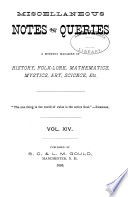 | Physics - 1903 - 422 pages
...following statement of Newton's First Law (p. 36) harmonizes with the facts : " Every body perseveres in its state of rest or uniform motion in a straight line unless it receives energy from or gives off energy to some other body." Such a statement assumes that... | |
 | Chemical engineering - 1913 - 110 pages
...energy of the moving body. This may be expressed by Hewton»e law of motion that «A body will continue in its state of rest or uniform motion in a straight line, unless acted upon by some applied force*, and in that case "the change from rest or uniform motion... | |
 | Questions and answers - 1896 - 410 pages
...that same pen in its state of fluid steel; and then the Newtonian statement "Every body continues in a state of rest, or uniform motion in a straight line...far as it may be compelled by force to change that state," with the gaseous components of the pen. This comparison is an example in corresponder.ee. It... | |
 | Literature - 1908 - 860 pages
...exhibits a quality akin to the "inertia" of matter, which tends to retain every material body in its stale of rest or uniform motion in a straight line, except so far as it is compelled by forces to change that state. This at once raises for us the new question. May not the... | |
 | James Tribe - Steam-engines, Compound - 1899 - 148 pages
...engine practice as HorsePower MECHANICAL FORCE AND RESISTANCE. Newton's first law of motion reads: "Every body continues in its state of rest or uniform motion in a straight line, except in so far as it may be compelled by impressed forces to change that state." Force an4,resistance, when... | |
 | Charles Burton Thwing - Physics - 1900 - 396 pages
...of Sir Isaac Newton, which are known as Newton's Laws of Motion. 11. Newton's Laws of Motion. — I. Every body continues in its state of rest or uniform motion in a straight line unless acted upon by some external force. 11. Amount of motion is proportional to the force applied... | |
 | Michael Maher - Psychology - 1902 - 658 pages
...confirmed, if not independently proved by the principle of inertia, Newton's first law of motion : " Every body continues in its state of rest or uniform motion in a straight line except in so far as it may be compelled by impressed forces to change its state." Harald Hoffding is perhaps... | |
 | William Wade Fitzherbert Pullen - Mechanics - 1902 - 436 pages
...is, the second states how it is measured, the third states how one body acts upon another. Law i. — Every body continues in its state of rest or uniform motion in a straight line until it is made to change that state by a force. This simply states that if no force act on a body... | |
 | John Oren Reed - Physics - 1902 - 336 pages
...body in motion moves until some force stops it. This is all summed up in Newton's First Law of Motion. "Every body continues in its state of rest or uniform motion, in n straight line, except in so far a# it is compiled to change tfiat state by force impressed upon it."... | |
| |